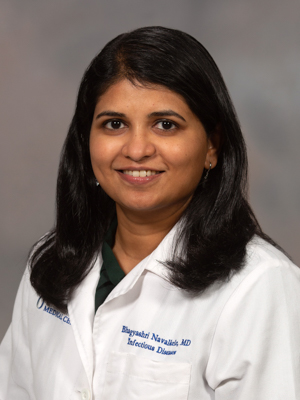Parents just as prone to RSV as older adults, children
Cases of Respiratory Syncytial Virus Infection, or RSV, surged in multiple parts of the nation this fall, helping to form the “tripledemic” monstrosity of illnesses detailed in media reports in November.
RSV is a common respiratory virus with symptoms that mimic traditional colds. It’s most prevalent in winter, along with colds and influenza, and typically hits the vulnerably young and the very old. But, the experts at the University of Mississippi Medical Center stress it’s just as easy for younger adults to catch some form of the common respiratory virus – regardless of age.

“Cases of adults with RSV are varied, in terms of age, but usually not severe enough to require hospitalization,” said Dr. Bhagy Navalkele, associate professor of infectious diseases and medical director for infection prevention, pointing out the most common respiratory ailments that affect adults last about 7-10 days and can be treated easily with supportive care and over-the-counter decongestants.
“But, there is no specific treatment for RSV in adults like we have with COVID and flu, plus there are also cases where the coughing, for example, can linger for weeks to months,” she said, such as with first-time parents or adults who were not enrolled in child care facilities as an infant or toddler, thus their immune systems are more susceptible to RSV and the worst of its symptoms later in life. “So, exposure level or immunity in the past makes a difference.”
The virus causes an array of symptoms in infants and toddlers and is the leading cause of bronchiolitis and pneumonia in children younger than 1 year of age, according to the Centers for Disease Control and Prevention. In adults, especially those 65 and older, the virus hospitalizes between 60,000 and 120,000 in the United States, with up to 10,000 deaths due to the infection. It can also worsen pre-existing health conditions such as asthma, chronic obstructive pulmonary disease (COPD) and congestive heart failure.
Nationally, the virus has hit all age groups harder than usual this winter. Hospitalization rates for older adults have surged at a rate 10 times higher than last cold-and-cough season. In November, the CDC issued a health advisory after steady increases in RSV-related emergency visits and hospitalizations. On Monday, the agency recommended wearing masks for all age groups is the best precaution people can take to reduce their chances of catching any of the three respiratory viruses, as hospitalization rates for all of them remained either high or rising as of the week ending Dec. 2.
Navalkele stressed diligent common sense for parents and caregivers of infants and young children. That means coughing into elbows and the upper arm area in general, washing hands for 20 seconds with soap and water and limiting exposure to environments prone to rapidly-spread respiratory viruses, such as indoor gatherings and contact with sick people.
As for holiday gatherings, she said, it’s quite the similar set of recommendations from past holiday seasons in the era of COVID and heightened awareness of similar viruses.
“If you plan to be in close contact with friends and family, simply put normal hygiene measures into place,” she said. “If you or your child get sick, isolate and treat. It’s up to you to be protected and make sure others in your family are doing the same whether you’re having symptoms or not.”

Dr. April Palmer, professor and chief of pediatric infectious diseases, said RSV cases being admitted into Children’s ER are down since a spike during the summer months. For October, patients in the emergency room diagnosed with RSV totaled 118, a figure that dropped to 30 in November. Both were down from 316 in July. Cases of influenza, however, were on the rise during the month, with 957 seen in November, versus 321 in October.
“RSV is starting to fall in our area since the summer, but we’re seeing a spike in flu,” Palmer said.
Still, adults who know their exposure to RSV via young children – particularly first-time parents – need to stay vigilant because winter is still considered the prime time of year for the illness, she said.
“We usually see two versions of the virus at this time of year,” she said. “New parents and those who haven’t been around children that much are fully susceptible because their immunity won’t be built up as much. A good hand-washing is still the best thing parents and grandparents can do to avoid getting sick.”
Symptoms of RSV, flu and the common cold can be similar in adults, so diagnostic testing is the way to go especially if coughs, sore throat, chest congestion, runny nose and instances of fever seem to linger for too long, UMMC experts advise.
Testing for RSV, COVID-19 and flu is available for any symptomatic patient in the ER or hospitalized. Tests for each are also available at most UMMC outpatient clinics, including the Pavilion, Jackson Medical Mall, Lakeland and Flowood.
No proven vaccine exists against RSV, though that could change by next winter. In November, drug maker Pfizer announced plans to apply to the FDA by year’s end for a vaccine given during pregnancy that aims to stop severe symptoms of RSV during a child’s first six months of life.
The above article appears in CONSULT, UMMC’s monthly e-newsletter sharing news about cutting-edge clinical and health science education advances and innovative biomedical research at the Medical Center and giving you tips and suggestions on how you and the people you love can live a healthier life. Click here and enter your email address to receive CONSULT free of charge. You may cancel at any time.



